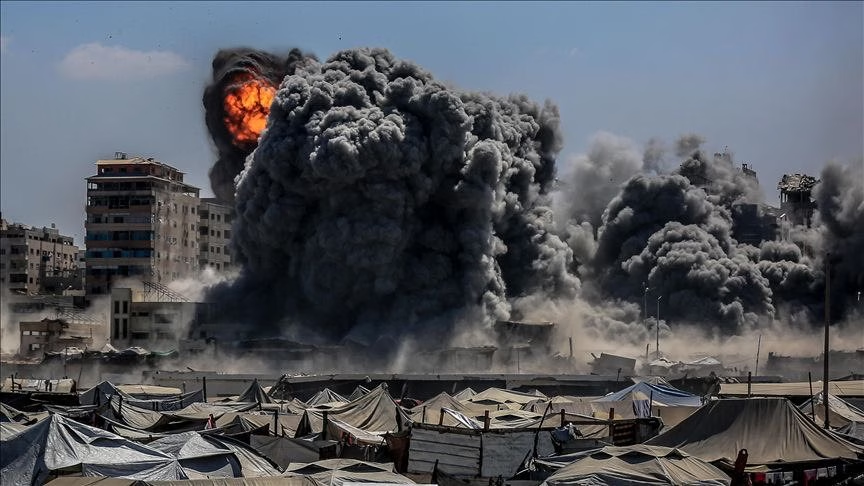Israel’s fragile ceasefire with Hamas faces renewed strain as National Security Minister Itamar Ben Gvir called for an immediate return to large-scale military operations in the Gaza Strip. His remarks came after Israeli forces and Hamas exchanged fire in Rafah, sparking fears that the short-lived truce could collapse entirely.
Calls For Renewed Military Action
The Israel Defense Forces (IDF) reported that militants in southern Gaza launched an anti-tank missile and opened fire on Israeli soldiers operating in Rafah on Sunday. In response, Israel carried out airstrikes against what it described as “terror targets.”
“I call on the prime minister to order the IDF to renew full-scale fighting in the Strip at full strength,”
Gvir declared in a public statement.
“The false belief that Hamas will change its ways, or will even abide by the agreement it signed, is proving to be dangerous to our security. This Nazi terrorist organization must be destroyed completely and the sooner the better.”
His remarks mark one of the most forceful demands from within Israel’s cabinet to end the ceasefire and resume hostilities.
The Fragile Ceasefire Agreement
The truce, reached earlier this month under United States President Donald Trump’s 20-point peace framework, was intended to de-escalate a conflict that has devastated both sides. The first phase of the plan required Hamas to release all remaining Israeli hostages within seventy-two hours in exchange for the release of Palestinian prisoners.
By Monday, Hamas announced it had fulfilled its obligations, freeing the last twenty living captives and returning the remains of twelve others. The organisation claimed that further recovery efforts were hindered by the extensive destruction in Gaza and the continued presence of Israeli troops in some districts.
🚨Israel resumes the genocide with full force; over a 100 “targets” bombed since this morning, including a school full of refugees. 18 Gazans killed so far.
Israel halts all entry of aid to Gaza.
This is the chronology of events tracking how we go here:
1- Israel killed 11… pic.twitter.com/FmM2hLFkXk
— Muhammad Shehada (@muhammadshehad2) October 19, 2025
Hamas Maintains Commitment To The Truce
Senior Hamas figure Izzat al-Risheq issued a counterstatement the same day, asserting the group’s continued adherence to the ceasefire and accusing Israel of fabricating pretexts for aggression.
“The Israeli occupation is violating the ceasefire and seeking excuses for its crimes,”
al-Risheq said. Hamas’s armed wing further denied involvement in the Rafah attack, adding that its communication with local factions in that region had been severed since March.
“We have no information about any incidents or clashes in Rafah, which is under [Israeli] occupation control,”
the military wing stated.
Israel has violated the Gaza ceasefire 47 times since the truce began in early October, resulting in 38 Palestinian deaths and 143 injuries, according to Gaza’s media office.
Just today, 11 members of the same family were killed when the bus they were traveling in was struck by… pic.twitter.com/bQyscGi6We
— AF Post (@AFpost) October 18, 2025
Disputes Over Compliance
Israel, however, contends that Hamas has failed to deliver the remains of sixteen captives. Officials in Jerusalem have accused the group of breaching the ceasefire terms, while Hamas in turn has charged Israel with repeated violations. Both sides continue to exchange blame, further undermining trust in the tenuous peace arrangement.
Late on Sunday, Prime Minister Benjamin Netanyahu instructed the IDF
“to take firm action against terror targets in the Gaza Strip,”
according to a statement from his office. The message offered no indication of whether this directive would escalate into a full-scale military renewal.
Escalation Risks
Analysts warn that a breakdown in the ceasefire could trigger another wave of intense fighting in Gaza, deepening the humanitarian crisis and threatening regional stability. With both sides trading accusations and trust rapidly eroding, prospects for lasting calm appear increasingly distant.
Observers have noted that this is not the first time Israel has been accused of leveraging ceasefire deals primarily to secure hostage releases before resuming military operations in Gaza, a pattern critics say undermines future negotiations.

















